RYO Review: Silently and Very Fast by Catherynne M. Valente
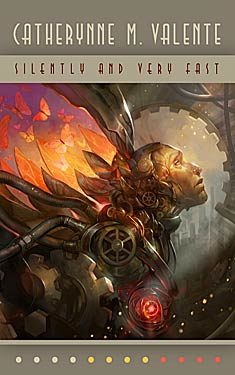
 I read the first few chapters of this novella as an act of faith, because Valente has earned my trust as a reader, and because Silently and Very Fast has an award and nomination list long enough to be its own short story (it won the Locus Award for Best Novella, and was nominated for the Hugo, Nebula, and World Fantasy awards). So I waded through dense cyber-fairytale imagery on the assumption that it would resolve itself into a story. It did. A very, very good one.
I read the first few chapters of this novella as an act of faith, because Valente has earned my trust as a reader, and because Silently and Very Fast has an award and nomination list long enough to be its own short story (it won the Locus Award for Best Novella, and was nominated for the Hugo, Nebula, and World Fantasy awards). So I waded through dense cyber-fairytale imagery on the assumption that it would resolve itself into a story. It did. A very, very good one.
It’s difficult to find the beginning of Silently and Very Fast; it’s one of those Ouroboros stories which loops and curls until it’s eating its own tail. At some point, it becomes clear that your narrator is Elefsis, a self-aware program that lives in the consciousness of the Uoya-Agostino family in a future version of Hokkaido. Elefsis is passed down through the generations in a surgically-implanted jewel, and each human mind she lives in teaches her more about emotion, humanity, creation, and symbolic representation. When the book begins, Elefsis has just been hastily transferred to a woman named Neva — the last surviving member of the family. Neva is tense and unhappy to be saddled with the family heirloom, and she keeps secrets tucked away in their shared dreamscape. Elefsis mines their internal consciousness (the Interior), and discovers more about the world outside them and her place in it.
RYO Review: Ancillary Justice by Ann Leckie
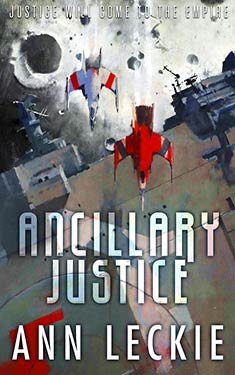
 Hype is an untrustworthy thing, which has led me astray before. It either ratchets my hopes so high that they’re bound to be disappointed (see: A Song of Ice and Fire) or it leaves me snarking condescendingly about popular opinion and the “masses” and how no one really understands empire (see: The Hunger Games). But sometimes, hype operates like giant flashing arrows pointing me towards a book that I never would have otherwise discovered, and my entire faith in popular opinion and my fellow genre-readers is restored. That was my experience with Ancillary Justice, Ann Leckie’s 2013 debut novel. From the back-cover blurb, I would never have bought it: On a remote, icy planet (oh look, Hoth) the soldier known as Breq (oh look, an ex-military alias) is drawing closer to completing her quest (gee, tell me more). But it was a riveting, smart, and brilliantly composed novel, which has convinced me that the space epic is still alive and well.
Hype is an untrustworthy thing, which has led me astray before. It either ratchets my hopes so high that they’re bound to be disappointed (see: A Song of Ice and Fire) or it leaves me snarking condescendingly about popular opinion and the “masses” and how no one really understands empire (see: The Hunger Games). But sometimes, hype operates like giant flashing arrows pointing me towards a book that I never would have otherwise discovered, and my entire faith in popular opinion and my fellow genre-readers is restored. That was my experience with Ancillary Justice, Ann Leckie’s 2013 debut novel. From the back-cover blurb, I would never have bought it: On a remote, icy planet (oh look, Hoth) the soldier known as Breq (oh look, an ex-military alias) is drawing closer to completing her quest (gee, tell me more). But it was a riveting, smart, and brilliantly composed novel, which has convinced me that the space epic is still alive and well.
WoGF Review: Hild by Nicola Griffith
 Alix Heintzman (alixheintzman) recently earned herself a graduate degree in history from the University of Vermont, and has circled back to her Old Kentucky Home with her partner Nick Stiner. She spends her time semi-desperately repairing the abandoned house they just bought, writing history high school curriculum, and reading fantasy books. She reviews books on her blog, The Other Side of the Rain, and is a staff reviewer at Fantasy Literature.
Alix Heintzman (alixheintzman) recently earned herself a graduate degree in history from the University of Vermont, and has circled back to her Old Kentucky Home with her partner Nick Stiner. She spends her time semi-desperately repairing the abandoned house they just bought, writing history high school curriculum, and reading fantasy books. She reviews books on her blog, The Other Side of the Rain, and is a staff reviewer at Fantasy Literature.
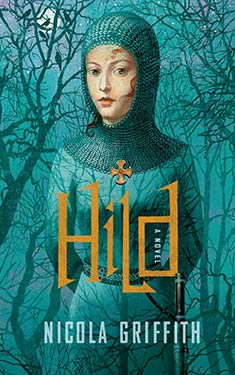 Nicola Griffith’s Hild: A Novel is something rare. It’s a historical fantasy, but it’s not a magical adventure, a bodice-ripper, a military drama, or even a political thriller. It’s not the kind of book you dive into and finish a day later and forget almost immediately. Hild is a whole world with a taste and texture of its own. It lingers.
Nicola Griffith’s Hild: A Novel is something rare. It’s a historical fantasy, but it’s not a magical adventure, a bodice-ripper, a military drama, or even a political thriller. It’s not the kind of book you dive into and finish a day later and forget almost immediately. Hild is a whole world with a taste and texture of its own. It lingers.
The story is a fictionalized (but not fantasized) vision of the early life of Hilda of Whitby, a slightly obscure 7th century English saint. The plot clings to the trailing skirts of a young girl who becomes the seer to a medieval King. Amid a sea of old English names and places (Ǽthelfrith, Ealdwulf, Caer Loid, Hwicce), Hild uses her influence and intelligence to navigate the choppy waters of politics and war. It’s a slow, beautiful story full of winter evenings by the hearth and long rides through the countryside and sudden spurts of violence. It’s simultaneously about the huge, grinding ways that cultures change, the depth and complexity of the past, and a young girl making her own way.
In the spirit of full confession, Hild is not technically fantasy. There’s no magic performed in the story. Merlin doesn’t stroll in halfway through and have a magical showdown with Morgan le Fay, and there aren’t any dragon sightings or wood sprites or Faeries spelled with an ‘e.’ Hild’s own magic as a seer is a combination of artifice, mystery, and her own fierce observational intelligence. But it does feel like fantasy, and not just because we’ve been hardwired to expect sorcery whenever we see a sword.
WoGF Review: Jonathan Strange & Mr. Norrell by Susanna Clarke
 Alix Heintzman (alixheintzman) recently earned herself a graduate degree in history from the University of Vermont, and has circled back to her Old Kentucky Home with her partner Nick Stiner. She spends her time semi-desperately repairing the abandoned house they just bought, writing history high school curriculum, and reading fantasy books. She reviews books on her blog, The Other Side of the Rain, and is a staff reviewer at Fantasy Literature.
Alix Heintzman (alixheintzman) recently earned herself a graduate degree in history from the University of Vermont, and has circled back to her Old Kentucky Home with her partner Nick Stiner. She spends her time semi-desperately repairing the abandoned house they just bought, writing history high school curriculum, and reading fantasy books. She reviews books on her blog, The Other Side of the Rain, and is a staff reviewer at Fantasy Literature.
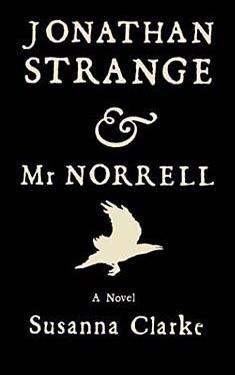 However Jonathan Strange & Mr Norrell has been described to you—Jane Austen mixed with Harry Potter, or Dickens dusted with Phillip Pullman—it isn’t any of those things, because it isn’t like anything else. Jonathan Strange is a beautifully-wrought story filled with half-remembered fairy tales and shadowy woods and madness. It is one of my very favorite fantasy novels. It is also one of the most brilliant historical novels I have ever read.
However Jonathan Strange & Mr Norrell has been described to you—Jane Austen mixed with Harry Potter, or Dickens dusted with Phillip Pullman—it isn’t any of those things, because it isn’t like anything else. Jonathan Strange is a beautifully-wrought story filled with half-remembered fairy tales and shadowy woods and madness. It is one of my very favorite fantasy novels. It is also one of the most brilliant historical novels I have ever read.
“Some years ago there was in the city of York a society of magicians. They met upon the third Wednesday of every month and read each other long, dull papers upon the history of English magic,” (1).
In the first two sentences, we are introduced to the two major premises of the book: That the English past had magic, but its present does not. Under the rule of the Raven King, the Middle Ages were a time of powerful magicians and unruly faeries. But the Raven King abandoned England, and magic slowly seeped away from the country. By 1806, magicians are old men in wigs who study magical history and debate the theoretical application of spells (the books magicians study, like Lanchester’s Treatise concerning the Language of Birds or Strange’s The History and Practice of English Magic, are endearingly described in footnotes throughout Jonathan Strange).
WoGF Review: In the Night Garden by Catherynne M. Valente
 Alix Heintzman (alixheintzman) recently earned herself a graduate degree in history from the University of Vermont, and has circled back to her Old Kentucky Home with her partner Nick Stiner. She spends her time semi-desperately repairing the abandoned house they just bought, writing history high school curriculum, and reading fantasy books. She’s dipping her toes into the blogosphere at The Other Side of the Rain to sharpen her writing skills and also not-incidentally talk about the books she loves. And to spare Nick from endless discussions of plot details in books he hasn’t read.
Alix Heintzman (alixheintzman) recently earned herself a graduate degree in history from the University of Vermont, and has circled back to her Old Kentucky Home with her partner Nick Stiner. She spends her time semi-desperately repairing the abandoned house they just bought, writing history high school curriculum, and reading fantasy books. She’s dipping her toes into the blogosphere at The Other Side of the Rain to sharpen her writing skills and also not-incidentally talk about the books she loves. And to spare Nick from endless discussions of plot details in books he hasn’t read.
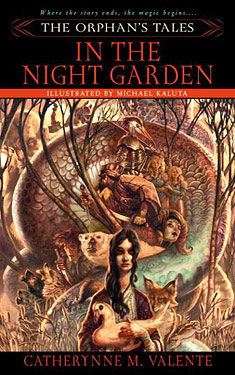 In the Night Garden is essentially Arabian Nights, if Scheherazade had been a feminist literary critic with a working knowledge of world mythology and a wicked sense of irony. Certainly, this Scheherazade wouldn’t have ended up marrying the Sultan who put his first 1,000 wives to death.
In the Night Garden is essentially Arabian Nights, if Scheherazade had been a feminist literary critic with a working knowledge of world mythology and a wicked sense of irony. Certainly, this Scheherazade wouldn’t have ended up marrying the Sultan who put his first 1,000 wives to death.
It starts with a young girl with dark tattoos around her eyes: tiny, black letters spelling out hundreds of fairy tales. A young prince becomes obsessed with the girl’s stories, and very soon the reader and the young prince are both sitting in rapt silence in the night garden, listening. For maybe five pages, you feel you’re in comfortable, predictable territory. The tattooed girls tells of a prince who runs away from home and discovers a witch’s hut in the woods. Ah, you think, if he doesn’t watch his mouth he’ll be set three impossible tasks. Or he’ll be transformed into a pig, or a beast, or wind up living in an enchanted castle waiting for his true love to see past his ugliness and marry him. But the rules are different in the night garden. Instead, the witch woman emerges, horribly scarred, and tells the prince her story. The nesting stories continue, each one more unearthly and brilliant and unpredictable than the last.



















 Full Details
Full Details

